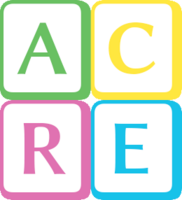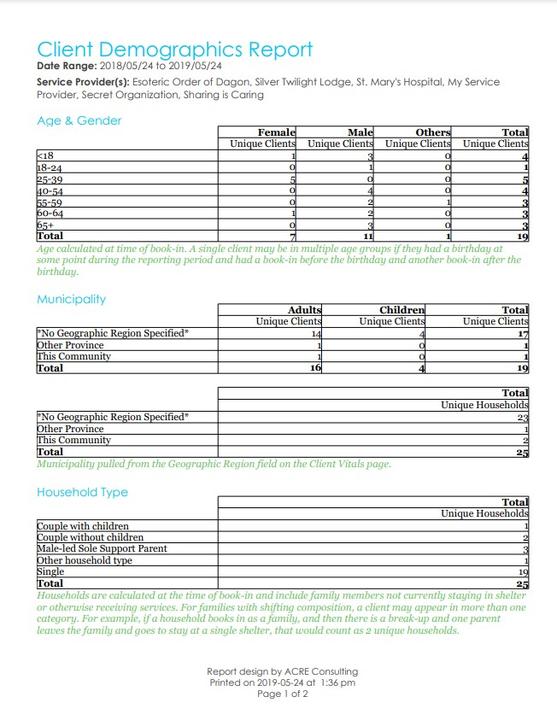ACRE Consulting's Unofficial HPP Report
Program Participants
This report is intended to allow communities in Ontario who receive HPP funding to use HIFIS data to report out on the program participants section of the HPP reporting requirements, which encompass the majority of sections 1 and 2.
Broadly speaking, the report summarizes data about which households received services associated with which Programs. It also determines the first time the household received a service like it, and from that determines whether the client was homeless or at risk of homelessness at the time, and also whether that means the client was new to HPP or a returning household.
This is an unofficial report and is not endorsed by the Ontario MMAH.
Note: this report requires the Program Entry Dataset to run. These products are sold separately but have the option to purchase them together using the Buy Now button below.
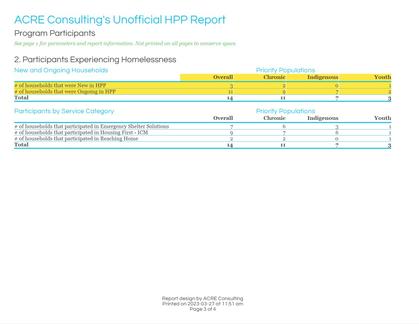


1 & 2. Measuring Program Participants
Service Managers are required to collect the total number of participant households that were assisted by HPP, and further to collect and report the types of assistance provided to each household.
Required data elements include:
- households at-risk of homelessness that are ongoing in HPP
- households at-risk of homelessness that are new to HPP
- households experiencing homelessness that are ongoing in HPP
- households experiencing homelessness that are new to HPP
- households at-risk of homelessness who received Housing Assistance funded by HPP
- households experiencing homelessness who received Housing Assistance funded by HPP
- households at-risk of homelessness assisted with Supportive Housing funded by HPP
- households experiencing homelessness assisted with Supportive Housing funded by HPP
- households at-risk of homelessness who received Community Outreach and Support funded by HPP
- households experiencing homelessness who received Community Outreach and Support funded by HPP
Features of this Report
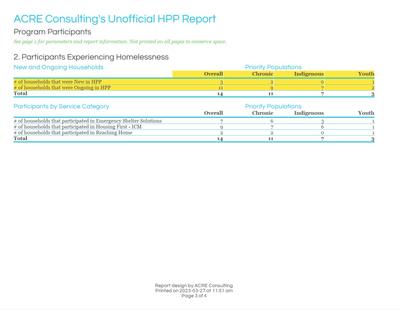
Meet Reporting Requirements
Report features aggregated service and program data, allowing you to report on data elements 1.1, 1.2, 1.3, 1.4, 1.7, 2.1, 2.2, 2.3, 2.4, and 2.6 for all required reporting breakdowns.
Some communities may also be able to use this to report on elements 1.3.1, 2.3.1, and 5.1.
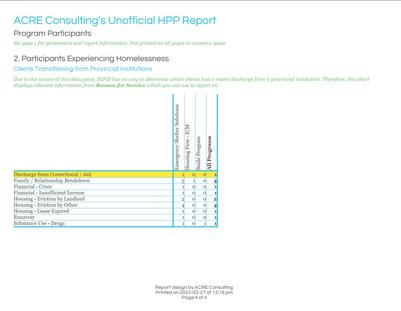
Discharges from Provincial Institutions
Includes 4 methods of tracking discharges from provincial institutions:
- Housing History
- Reason for Service
- Referred From
- Life Events

Tons of Parameters!
There are so many parameters we can't print them all on every page. You can customize how to handle Unknown housing status and Transitional housing status. Choose eligible Programs, Service Providers, and Service Types. And of course, use the parameter for Discharge Module.
Frequently Asked Questions
- What version of HIFIS is required to run this report? This report should run on any version of HIFIS version 4.0.57 and higher.
- What happens if the report stops working? This report will be maintained into the foreseeable future. If a software update causes it to stop working, or if we find an error, we'll update the file and let you know there's a new version available, at no additional cost to you.
- How long does this report take to run? The run-time varies depending on how much data is in your database, and how long a date range and how many service providers you select when running the report. However, we have tested the report with large data volumes and it runs quickly and efficiently.
- What parameters are included in this report? Start Date; End Date; Service Providers; Programs; Service Types; Discharge Module (single-select drop-down which contains 4 options: Reason for Service, Referred From, Housing History, Life Events); How should Transitional housing status be treated?; How should Unknown housing status be treated?
- How do I run this report? Check out our README file.
- I have a question about the report calculations. Check out our Report Guide.
You may also like...
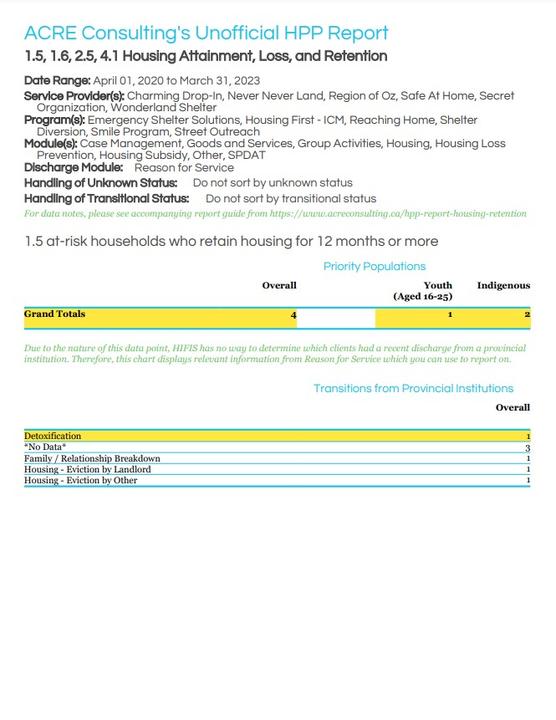
This report is intended to allow communities in Ontario who receive HPP funding to use HIFIS data to report on housing attainment, loss, and retention. Broadly speaking, the report summarizes data about households that had a move-in or retained housing for 12 months or who became homeless, filtered by date range, service providers, programs, and service types.
This is an unofficial report and is not endorsed by the Ontario MMAH.
This report is intended to allow communities in Ontario who receive HPP funding to use HIFIS data to report on housing attainment, loss, and retention. Broadly speaking, the report summarizes data abo…
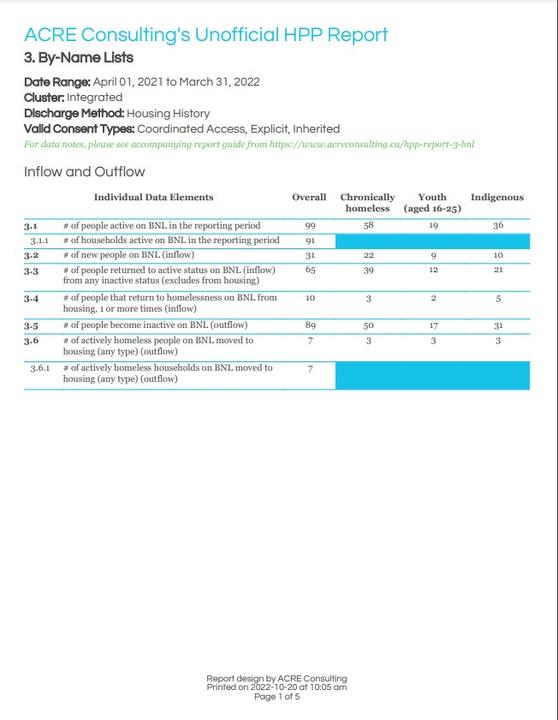
This report is intended to allow Ontario communities who receive HPP funding to use HIFIS data to report out on the By-Name List section of the HPP reporting requirements. Broadly, it reports on the aggregated inflow and outflow to and from your By-Name List (BNL) and breaks down these numbers into the priority population groups.
This is an unofficial report and is not endorsed by the Ontario MMAH.
This report is intended to allow Ontario communities who receive HPP funding to use HIFIS data to report out on the By-Name List section of the HPP reporting requirements. Broadly, it reports on the a…
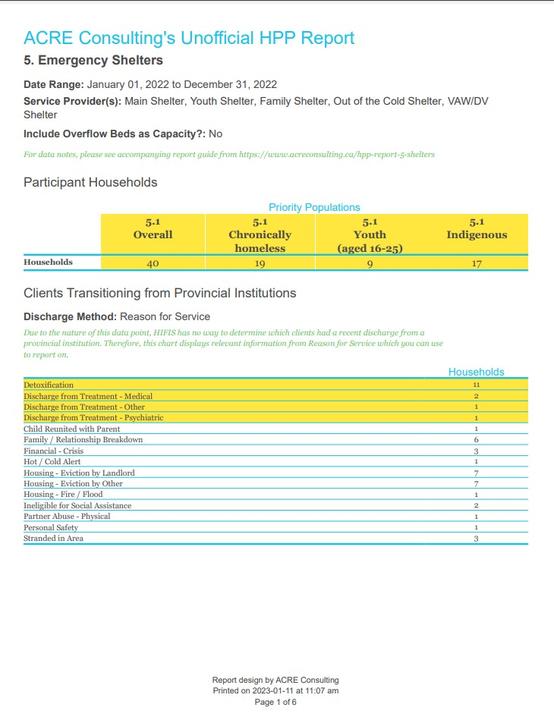
This report is intended to allow communities in Ontario who receive HPP funding to use HIFIS data to report out on the Emergency Shelters section of the HPP reporting requirements. Broadly, it reports on emergency shelter capacity and usage, broken down into priority population groups.
This is an unofficial report and is not endorsed by the Ontario MMAH.
This report is intended to allow communities in Ontario who receive HPP funding to use HIFIS data to report out on the Emergency Shelters section of the HPP reporting requirements. Broadly, it reports…
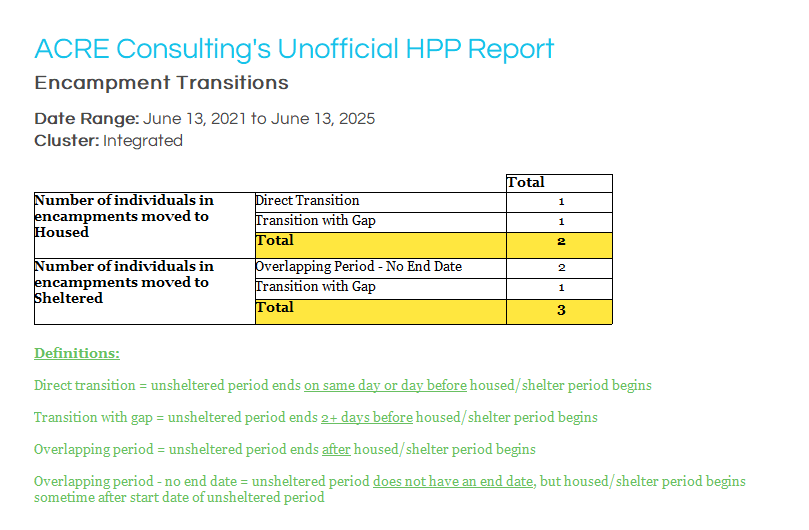
This report is intended to allow communities in Ontario who receive HPP funding to use HIFIS data to report on encampment transitions. This report shows the number of clients who moved from encampments to other housing types.
This is an unofficial report and is not endorsed by the Ontario MMAH.
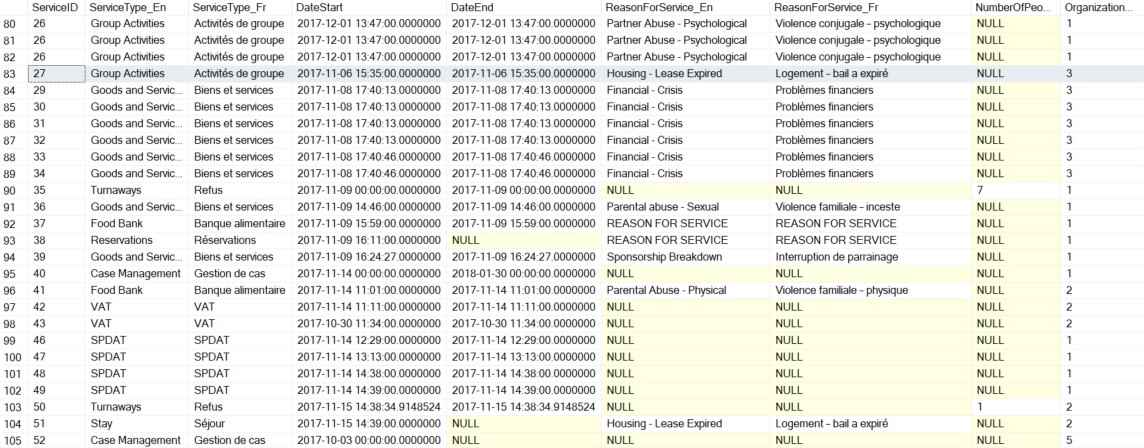
This dataset is a fixed version of vw_ClientsServices. For several years now there has been a bug present in vw_ClientsServices, which is referenced by many reports. The bug? This view doesn't include Group Activities, but it should. We've created an identical version of the view that also includes Group Activities.
This dataset is a fixed version of vw_ClientsServices. For several years now there has been a bug present in vw_ClientsServices, which is referenced by many reports. The bug? This view doesn't include…
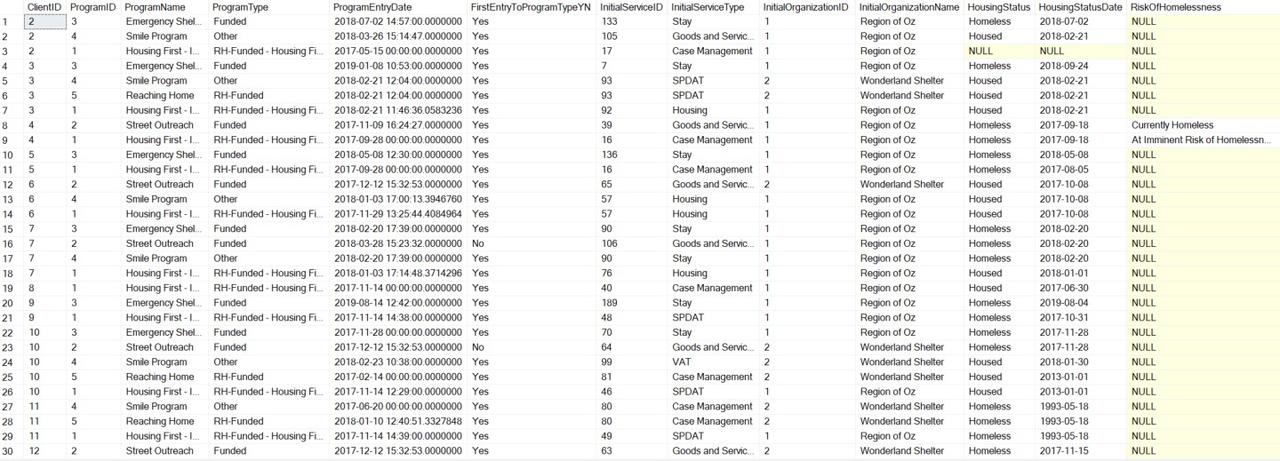
This view pulls data from all services where a Program has been added. For each Program, a client's Program Entry Date is determined as the earliest date that a client ever began receiving a service associated with that Program. In addition, the view calculates what the client's most recent Housing Status was at the time of Program Entry. Intended for HPP-funded communities.
This view pulls data from all services where a Program has been added. For each Program, a client's Program Entry Date is determined as the earliest date that a client ever began receiving a service a…
Looking for more?

